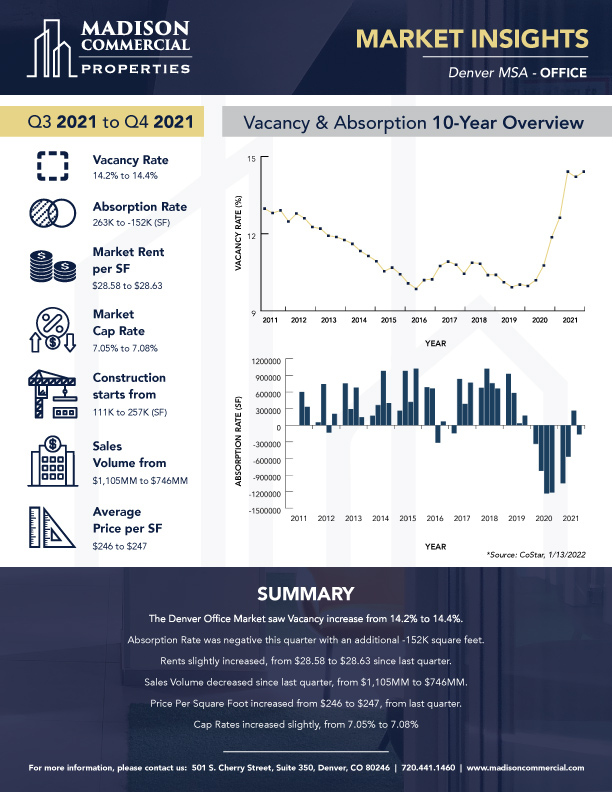Doug Gates & Ryder Fink
Doug_Ryder@madisoncommercial.com
720.600.2706 | Contact Us | Meet The Team



Looking For
Office Space
in the
Denver area?
We can help you navigate the market, negotiate lease terms on your behalf, and find the right location for your business!
Contact Us Today!
What problems will you have looking for space alone?
Looking for space alone is complicated by the inaccuracies in space availability. Often times listings are not up to date and brokers fail to return calls from clients not represented by a broker. Furthermore, without the industry knowledge, when it comes time to negotiating lease terms, tenants without a broker may be taken advantage of, failing to understand what bargaining pieces they are eligible for. The listing platform that commercial brokers use is called CoStar. LoopNet is the public facing listing website, which is owned by CoStar but not all listings on CoStar are on LoopNet.
Without a tenant rep broker, navigating the lease market is time consuming and can pull you away from working on your business. Resources like LoopNet, the commercial equivalent to Zillow, and various brokerage websites are by no means an exhaustive list of the available spaces out there, and typically require a fair level of market knowledge, negotiating tactics, and connections within the industry to find the most suitable space for you.
Instead of spending countless hours educating yourself on the real estate market, take the passenger seat and allow a tenant representation broker drive, that way you can focus on your part of the business.
Different Types of Commercial Leases:
Triple Net (NNN): the tenant is responsible for the base rent plus the NNN amount, which is your portion of the buildings taxes, insurance and maintenance. In these leases, the landlord provides their building to the tenant and the tenant is typically responsible for the spaces expenses such as HVAC System, etc.
Modified Gross (MG): the tenant is responsible for the base rent plus smaller expenses, such as utilities.
Full Service Gross (FG): the tenant is responsible for the base rent only, which includes repairs and maintenance, insurance, taxes, utilities, etc. Though, if the landlords annual expenses increase above the “Base Year” from when you occupied the space, the tenants would share the additional increase of expenses.
To determine the cost of the lease, you take the base rent plus the NNN (if applicable), multiply it by the SF, then divide by 12.
For example:
$25/SF Base Rent + $5/SF NNN = $30/SF x 1,400 SF/12 = $3,500/month
For budgeting purposes, add in $0.50/SF/YR increase the $/SF.
Why You Should Hire a Commercial Broker
Source: Crexi 21′
When people look for a home, one of the first things they do is hire a residential realtor, so why wouldn’t you do the same when looking for commercial space?
In this article, we’ll look at the benefits of listing commercial real estate with a broker, how to find the best broker in your market, and six key questions to ask before hiring a commercial broker.
Benefits of Hiring a Commercial Real Estate Broker
A commercial real estate broker works with property owners and tenants to buy, sell, and lease real estate for commercial use. Compared to buying a home, where a lot of emotion is involved, a commercial agent understands that investment real estate is mainly a numbers game. The top benefits of hiring a skilled commercial real estate broker in your local market include:
- In-depth market knowledge to find the best commercial property for sale, including properties just coming to market.
- They represent both buyers and sellers of commercial real estate – and tenants seeking to lease or sublease space – while always keeping the client’s best interest in mind.
- Hiring a commercial broker is cost-effective for CRE investors and tenants because the seller or landlord normally pays fees instead of the client.
- Access to commercial listing sites to quickly lease space by generating as much demand as possible from qualified tenants.
- Posting available commercial property for sale on the top commercial real estate websites ensures the property is seen quickly by as many buyers as possible.
- Networking with other commercial agents and local real estate experts helps locate hard-to-find property and allows investors and tenants to get the best deals on the market today.
- Help clients to stay objective and focused, calmly explaining and exploring all options of a commercial real estate transaction without tipping their hand to the other parties in the deal.
- Commercial real estate brokers also save clients time and money by doing the legwork for them, ensuring you will get the best deal possible.
Skills to Look for in a Commercial Broker
Finding a great commercial broker is similar to looking for any other specialized service professional, such as a doctor or lawyer. Skills to look for in a commercial real estate broker include:
Expertise – Particularly, expertise in specific commercial real estate asset classes like office, retail, multifamily, industrial, or special use investments.
Experience – What they’ve done, whether that’s representing tenants looking for space to lease or sublease or working with a landlord to lease or sell commercial property.
Network – Presence in a specific geographic area or submarket signifies the broker has an established network of contacts and understands how deals get done and how tenants and property owners work.
What is a Tenant Representation Broker?
Tenant representation brokers work alongside tenants to assist them in all aspects of the leasing process. They are the concierge for all things leasing. Tenant reps. require no out-of-pocket fee and have dedicated their careers to learning the ins and outs of the commercial real estate industry.
What does a Tenant Representation Broker Do?
Tenant representation brokers bridge the gap between tenants and landlords. They facilitate the entire leasing process, from the initial needs assessment and site selection, to negotiation, execution of the lease, occupancy, and beyond. A tenant representation broker can assist you with:
- Relocating or renewing your lease.
- Identifying space wants & needs.Tenant rep brokers are excellent at helping identify what a tenant needs in their next space. They often do so by helping you answer the following:
- How much square footage do you need?
- What part of town do you want to be located in?
- What building and space amenities are desired?
- What is your preferred lease term?
- What can you afford as a business?
- Surveying the market to see which spaces are available.Navigating listing sites on your own can be tough, it is often difficult to tell what is sill available and what is not. Tenant rep brokers have access to many resources along with their connections in the industry to help identify options that best fit the tenant’s needs.
- Arranging tours to see potential spaces.
- Negotiating the terms of the space.Once a potential space is identified, tenant rep brokers can begin the most valuable portion of their job, the negotiation. Brokers have an advantage in the market, knowing fair lease rates and terms, both of which they can negotiate with the landlord on your behalf. This means tenant reps. help with submitting proposals, writing letter of intents, leveraging lease terms, and handling communication with the landlord.
- Finalize lease and coordinate move in date.
Meet the Team

Doug Gates & Ryder Fink
Contact us today at:
Doug_Ryder@madisoncommercial.com
Or
720.600.2706
Denver CRE Market Insights
Doug and Ryder offer customized commercial real estate solutions to help clients achieve their goals. They specialize in office leasing, acquisitions and dispositions. They implement a client-centric strategy to each transaction that aligns with creating lifelong relationships through commercial real estate investment.
